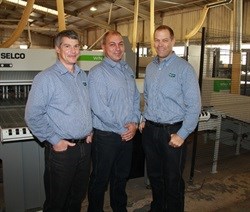UCAN spurs DIY in SA

In South Africa, the lifespan of a kitchen is 20 years plus. In Europe, the average kitchen is just seven to eight years old. That is probably because it is more affordable to replace a kitchen overseas, one simply buys a kitchen at retail level and installs it oneself or employs a fitter.
Andrew Milne, MD of Pinetown based UCAN, says that the company is following a similar model and believes that, although South Africans have not been big on DIY in the past, they will soon adopt a similar value-add approach. Tough economic times see people wanting more for their hard-earned money and buying down. The advantage with the range is that there is no compromise on quality.
Up until now, labour in South Africa has been relatively cheap which has made custom-made fitment an affordable option. However, this is changing fast. Salaries are climbing and artisans are in short supply. With higher overheads, outside fitters have to pass on costs in the form of higher prices, making it more feasible for homeowners to upgrade their kitchens in-house.
Adding upgrades simply
Established in 1995, the Home Concept Group, which owns UCAN and its sister brand, Home Concept, is well acquainted with the kitchen market from both sides of the spectrum. Home Concept provides bespoke kitchens, with a full range of kitchen products and accessories and a service that includes measuring, design, manufacturing and installation. UCAN offers the same products but excludes the onsite measuring and design service. Instead, customers make up their own kitchens with the help of in-store computer design software and store assistants that advise on measuring and choice of fittings.
Because a retail offering requires a high degree of standardisation, it also provides the perfect platform for cost effective upgrades. "The beauty of the range is that people can simply buy new cupboard doors. It is also easy for people to come back and extend."
Since inception, it has grown the range significantly to suit a diverse market both in terms of finishes, colours and products. Quality is key - because everything is flat packed, when the customer gets it, it has to be 100%.
Passing savings on
By supplying nationally, says financial director, Wayne Heathcote, the company has more extensive infrastructure and achieves sufficient volumes to lower its cost base, enabling the company to pass on savings to its customers.
Quantifying these savings is more complex. Actual costs are variable and depend on individual choices. However, like for like, the average consumer could save up to 50%.
The board used to manufacture the cupboards is all sourced locally, whilst the hardware, fittings and accessories are imported from India, China and Brazil. However, this is structured so that no intermediaries or agents are used. Buying direct means further cost savings can be passed on to customers, adds Milne.
Upgrade increases productivity
To increase production and efficiencies, grow volumes, improve on wastage and provide product of consistent quality, the company invested R8.5 million in Biesse equipment from Italy last year. This new plant enables it to cut batches of board, as opposed to one shape at a time, with extreme accuracy.
Since the upgrade, productivity has doubled, accuracy is as good as 100% and there has been a 30% improvement in wastage. "The crux is that the more volumes that you can push through, the more savings you can pass on to your customers. It also helps us position ourselves to serve a greater market."
Although initially aimed at the middle segment of the market, the brand does appeal to a broad spectrum, ranging from first time, entry-level homeowners to residents in plush suburbs. The gap between buyers of custom designed and DIY kitchens is also closing fast. For those who are not able or do not want to fit their own cupboards, the company has approved and guaranteed fitters in each of the main centres.
For more information, go to www.ucandoit.co.za.

























